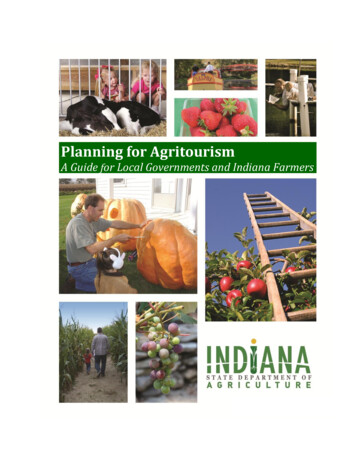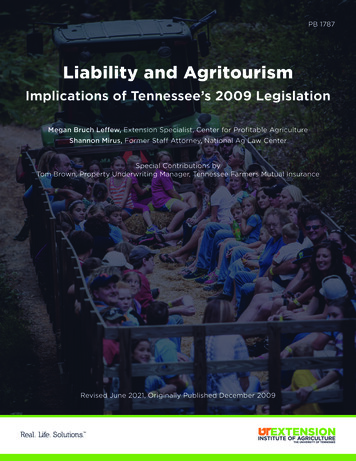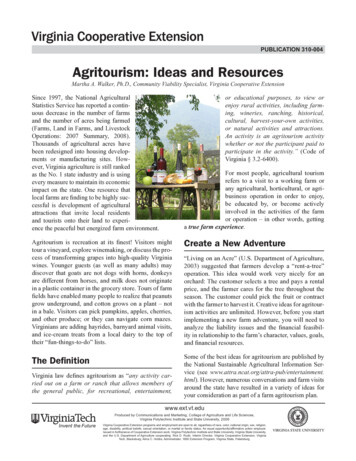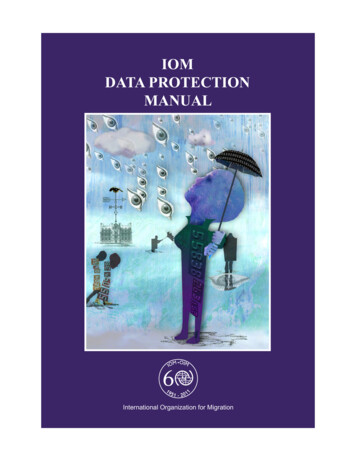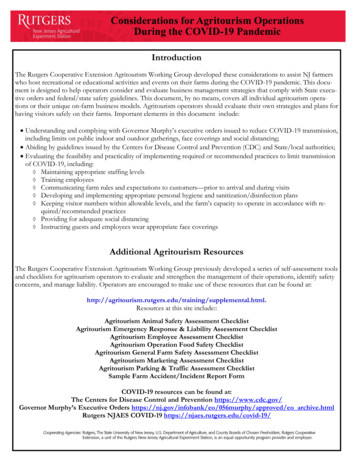
Transcription
Considerations for Agritourism OperationsDuring the COVID-19 PandemicIntroductionThe Rutgers Cooperative Extension Agritourism Working Group developed these considerations to assist NJ farmerswho host recreational or educational activities and events on their farms during the COVID-19 pandemic. This document is designed to help operators consider and evaluate business management strategies that comply with State executive orders and federal/state safety guidelines. This document, by no means, covers all individual agritourism operations or their unique on-farm business models. Agritourism operators should evaluate their own strategies and plans forhaving visitors safely on their farms. Important elements in this document include: Understanding and complying with Governor Murphy’s executive orders issued to reduce COVID-19 transmission,including limits on public indoor and outdoor gatherings, face coverings and social distancing; Abiding by guidelines issued by the Centers for Disease Control and Prevention (CDC) and State/local authorities; Evaluating the feasibility and practicality of implementing required or recommended practices to limit transmissionof COVID-19, including: Maintaining appropriate staffing levels Training employees Communicating farm rules and expectations to customers—prior to arrival and during visits Developing and implementing appropriate personal hygiene and sanitization/disinfection plans Keeping visitor numbers within allowable levels, and the farm’s capacity to operate in accordance with required/recommended practices Providing for adequate social distancing Instructing guests and employees wear appropriate face coveringsAdditional Agritourism ResourcesThe Rutgers Cooperative Extension Agritourism Working Group previously developed a series of self-assessment toolsand checklists for agritourism operators to evaluate and strengthen the management of their operations, identify safetyconcerns, and manage liability. Operators are encouraged to make use of these resources that can be found ental.html.Resources at this site include::Agritourism Animal Safety Assessment ChecklistAgritourism Emergency Response & Liability Assessment ChecklistAgritourism Employee Assessment ChecklistAgritourism Operation Food Safety ChecklistAgritourism General Farm Safety Assessment ChecklistAgritourism Marketing Assessment ChecklistAgritourism Parking & Traffic Assessment ChecklistSample Farm Accident/Incident Report FormCOVID-19 resources can be found at:The Centers for Disease Control and Prevention https://www.cdc.gov/Governor Murphy’s Executive Orders https://nj.gov/infobank/eo/056murphy/approved/eo archive.htmlRutgers NJAES COVID-19 https://njaes.rutgers.edu/covid-19/
Considerations for Agritourism OperationsDuring the COVID-19 PandemicHas the farm operator.CommentsCurrent Regulations.reviewed the most recent Governor’s executive orders and CDC guidelinesregarding COVID-19?.evaluated the size of the event or activity to determine if it is feasible basedon state/local laws and regulations? managed activities to operate at an appropriate capacity or scale that promotes social distancing and compliance with CDC guidelines, and state/localregulations?Signs and Symptoms.trained staff about CDC personal protection measures for COVID-19 thatmust be followed while working on the farm.?.discussed with staff members their concerns with elevated risks factors identified by the CDC for COVID-19?.required staff to perform daily personal health assessments/screenings priorto coming to work each day?.notified staff who have a fever of 100.4 (38.0 C) or above, or other signs ofCOVID-19 illness, or have been in contact with someone who tested positivefor COVID-19 to not report to work?.developed contingencies and/or coverage plans if an employee(s) is unable towork due to COVID-19 illness/exposure?Cloth Face Coverings.required the use of cloth face coverings for both staff and visitors as recommended by the CDC and state executive orders?.trained staff with information on the proper use, removal and washing ofcloth face coverings?.trained staff on when face coverings are not required? considered making face coverings available for visitors who do not havethem?
Considerations for Agritourism OperationsDuring the COVID-19 PandemicHas the farm operator.CommentsCleaning/Disinfection.supplied hand sanitizer and/or handwashing stations at entry and exit points,key thoroughfares, sales areas, and outside restrooms, etc.?.provided for increased and routine cleaning and disinfection of frequentlytouched surfaces, including food service areas? provided for shared objects to be replaced between uses, or cleaned/disinfected between uses if replacement is not feasible? supplied EPA-registered disinfectant wipes or sprays for staff to wipe downcommonly used surfaces (cash registers, checkout counters, hand rails, wagonstep rails) and trained staff to follow the cleaning product labels?.supplied disposable gloves for workers and instructed them to use gloveswhen removing garbage bags or handling and disposing of trash?.made a plan for regular cleaning, disinfection and restocking of both permanent and portable toilets/portable handwashing stations? (particularly hightouch surfaces such as faucets, toilets, stall doors, doorknobs, countertops, diaper changing stations, and light switches)Signage.posted signs at entry points/provided information on farm’s website and social media pages listing on-farm requirements (self monitor for COVID-19symptoms, cloth face covering, hand hygiene, social distancing, etc.)?.posted COVID-19 precaution signs as recommended by CDC at key areas onthe farm (keep social distancing, wear face coverings, hand hygiene, etc.)?.posted written information with proper hand washing instructions near sinks?Modified Layout/Physical Barriers.created pedestrian traffic flow patterns to reduce bottlenecks, pinch points,and cross flow contact?.organized attractions and facilities to provide for social distancing betweenvisitors?
Considerations for Agritourism OperationsDuring the COVID-19 PandemicHas the farm operator.CommentsModified Layout/Physical Barriers Cont.increased number of available restroom and handwashing facilities to alleviatecrowding?.posted physical guides and markings used to instruct guests to remain at least6 feet apart while waiting at entry points, restroom lines, lines for activities/attractions, check out counters, etc.?.created separate pick up and drop off locations for activities such as hayrides,when visitor numbers are high and there are lines for activities?.evaluated the need for physical barriers, such as partitions and plexiglassshields at key locations if needed (ticket booths, checkout stations, etc.)? provided proper distancing between sitting areas and tables in eating/restareas in compliance with guidelines/regulations?Communications and Marketing.designated an employee(s)/supervisor(s) responsible for responding toCOVID-19 concerns and policies if visitors have questions?.developed online communications to quickly notify potential visitors of thefarm’s current operating status, policies for entry and expectations while visiting the farm?.evaluated implementation of touchless payment options?.evaluated if online pre-sales, reservations, and pre-payments/orders can beimplemented?.advised the public, through the farm’s website, social media, promotional materials, or road-visible on-farm signs, when/if pre-registration is required tovisit attractions or events?.encouraged visitors to come to the farm during non-peak times (e.g. weekends/holidays) to lessen visitor capacity and encourage social distancing?Parking and Traffic.posted signs at ingress and egress areas to notify visitors when parking is atcapacity or if entrance requirements are restricted to reservations only? developed a plan for alternative parking layouts to accommodate social distancing and reduce congregation areas?.posted signs or other markings directing the flow of foot traffic in and out ofparking areas to agritourism areas to promote social distancing and facilitatesafe customer movement?
Considerations for Agritourism OperationsDuring the COVID-19 PandemicHas the farm operator CommentsResponse & Liability.documented efforts to inform customers about precautions and farm safetymeasures to address COVID-19 risks?.documented staff training procedures and farm protocols designed to reducethe risk of COVID-19 transmission to employees and visitors?.consulted with insurance providers on any current coverage changes due toCOVID-19?.remained apprised of and compliant with the Governor’s executive orderspertaining to COVID-19?.documented efforts to comply with recommended practices and guidelinesissued by CDC and other health agencies to mitigate the spread of COVID-19?(e.g. videoing or photos of signs, layouts, hygiene and sanitizing products being used on the farm).considered developing a written plan for on-farm COVID-19 procedures foremployees, visitors and emergencies?Employees.evaluated if staffing levels are sufficient to implement any additional COVID19 safety procedures?.trained employees to consistently and accurately answer customer questionsregarding COVID-19 safety practices or informed employees on where to direct questions from visitors, media, or other inquiries?.conducted routine staff update meetings to inform all employees of any necessary revisions or changes to operating procedures?Animal Safety educated visitors about the potential for animal-to-human spread of zoonoticdiseases from CDC information, including SARS, COVID-19, etc.? maintained separation of 6’ between potentially susceptible animal species? maintained safe distance between animals and visitors to eliminate contact? considered assigning staff to regularly monitor animal viewing areas and topromote hand washing before entering and exiting animal areas? developed social distancing plan for animal viewing areas such as groundmarkings, signs to remind visitors to maintain safe distances, etc.?
Considerations for Agritourism OperationsDuring the COVID-19 PandemicHas the farm operator.CommentsAnimal Safety Cont. provided for safe visitor flow including separate ingress and egress to minimize close interaction between visitors (one-way flow of foot traffic)? minimized items customers are allowed to take into animal viewing areas(strollers, coolers, food, etc.)? consulted a veterinarian for any special recommendations to protect animaland human health related to COVID-19? developed “touchless” feeding practices for visitors to feed animals includingsingle-use feeding practices?.instructed visitors in animal areas to follow CDC guidelines on proper hygiene when being near animal areas?Food Safety.discouraged customers from touching produce and other food items they donot purchase?.ensured employees preparing, handling or serving food to customers weargloves and change them often?.instructed employees to frequently clean and sanitize food contact surfacesand provided proper cleaning materials labeled for food contact surfaces?.provided ample time throughout the day for food handling employees towash their hands often and properly?.considered using pre-packaged, single-serve, or “grab and go” food items,especially for prepared foods and food for on-site consumption?.considered pick-your-own items in the overall admission price to deter foottraffic congestion when exiting the field to weigh or pay for items upon exit?.encouraged social distancing and capacity control of activities like, corn mazes, sunflower mazes, orchard picking, hay bale mazes, etc.?August 2020William Bamka, Burlington County Agricultural Agent, Rutgers NJAES Cooperative Extension, bamka@njaes.rutgers.eduMichelle Infante-Casella, Agricultural Agent, RCE of Gloucester County, minfante@njaes.rutgers.eduStephen Komar, Agricultural Agent, RCE of Sussex County, skomar@njaes.rutgers.eduMeredith Melendez, Agricultural Agent, RCE of Mercer County, melendez@njaes.rutgers.eduBrian Schilling, Director of Rutgers Cooperative Extension, schilling@njaes.rutgers.eduRichard VanVranken, Agricultural Agent, RCE of Atlantic County, vanvranken@njaes.rutgers.edu
The Rutgers Cooperative Extension Agritourism Working Group developed these considerations to assist NJ farmers . ment is designed to help operators consider and evaluate business management strategies that comply with State execu-tive orders and federal/state safety guidelines. . evaluated if online pre-sales, reservations, and pre .
